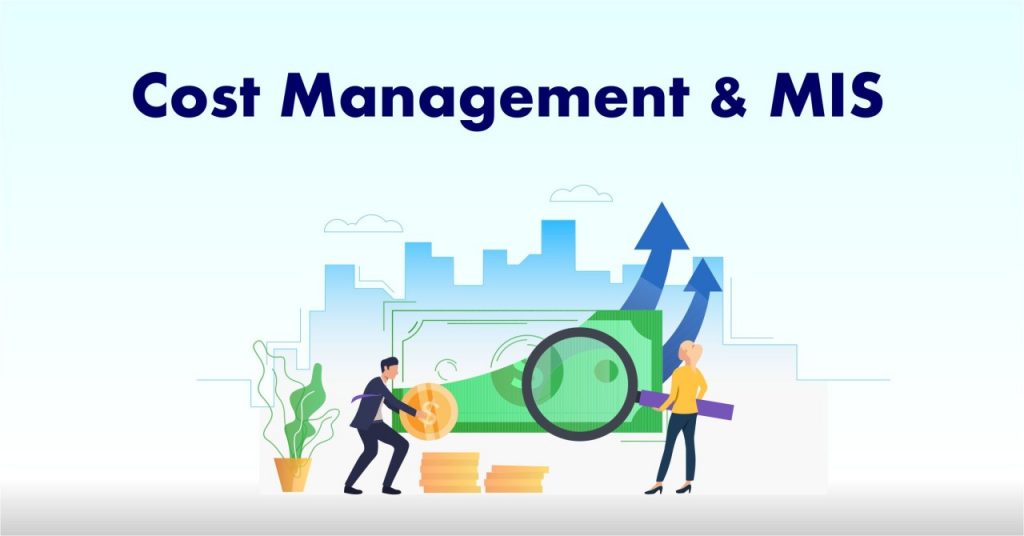
Profit Maximization objective of business is dependent upon two variables i.e. Revenue Maximization and Cost Minimization. Both these systems together lead towards maximization of top line and bottom lines of balance sheet.
Cost can be classified in three broad categories depending upon their linkages with revenue:
- Cost Directly linked with Revenue Generation
- Cost Indirectly linked with Revenue Generation
- Cost Not linked with Revenue Generation
Cost can also be categorized as costs related to:
- Business Acquisition
- Fulfillment or Order Execution
- Support
Elements of Cost: There are three major cost elements in any organization:
- Manpower
- Materials
- Expenses
Cost Management: A subject of Caution
Cost Management subject has to be treated with a caution. Any Cost Management framework has to ensure that:
- It does not impact Revenue Generation
- It does not create resentment among employees
- It does not impact vital creativity in organization
The best form of Cost Management comes out of Self Initiative from employees. All systems and frameworks for Cost Reduction have to be creative and owned by employees.
Framework for Cost Management System:
Cost Management Framework involves following steps:
1.Formation of Cost Management Group: This group shall have representatives from different function heads. The mandate of this group should be to keep cost to an agreed level and work to reduce the levels. This group shall take all steps to develop a Cost Management System.
2. Cost Classification & Cost Centers: Clear cut Classification and Codification of Cost Elements. Every cost from major to minor should have Cost Code and Cost Centre.
3. Integrating Costs Elements with Accounts Master: This shall ensure that Financial Accounts generate information for Cost Analysis & MIS.
4. Entering Cost Center with every transaction: This shall ensure that every cost is booked to a definite cost center. This is an important step towards Cost Management.
5. Zero Based Cost Budgeting: This ideally means challenging each element of cost with an open mind and answering questions such as:
- Whether it is really required?
- What will happen if it is not incurred?
- What can be done to reduce or eliminate it?
6. Integrating with ERP: Integration of Cost Management with ERP is essential. Cost Centers should be integral part of any transaction. Similarly budgets for costs should be mandatory for transactions. Any expense above budgets should raise alert and go to approval system.
7. Incentive Scheme: Building up an Incentive Scheme which identifies, measures and rewards the Cost Reduction results achieved in different schemes. This shall require building up a Suggestion Scheme where employees are encouraged to provide suggestions to reduce cost in different domains.
8. Collective Bargaining: Some of expenses like Purchases of Material can be done at Group Level. This shall help to bargain in a better way. This can also be applied to some of the services such as Travelling, Cars Hiring, Telephone Expenses etc.
9. Penalties: Penalties is one area which should get first priority. Penalties are mostly paid in area of Statutory Compliance \, Banks and Vendors etc. This cost need to show separately in monthly MIS and ways found to tackle it.
10. Process Mapping: Some of Costs like Manpower Cost and Fuel can also be tackled by way of Process Mapping for some critical areas which involve major cost drivers. These processes need to be identified and studied.
11. Manpower Cost: Manpower Cost is a critical cost. It is a sensitive matter and needs to be tackled with caution. HR Cost management requires that.
- Any Recruitment and Increment is done after due diligence from a core team which should include a person from Cost Management Committee.
- An effective Performance Support System should be put in place to ensure that every person is provides optimum performance matching his grade and remuneration.
- It has to be ensured that every person is effectively utilized. This also requires effective Process Mapping and Work Flow study.
12. Effective Asset Management: Some of costs related to Assets Management like Repairs and Maintenance, Fuel Consumption, Insurance can be controlled with asset management steps like preventive maintenance, AMC etc.
13. Cost Minimization MIS: Costing MIS should be part of regular Monthly MIS. This should be part of Profit Analysis Statement. A special Cost Minimization MIS can be compiled on regular basis. This report analyses Cost Structure of business and seeks to lay down targets and strategies for cost minimization. This report can be compiled on following lines:
a. Cost Heads: Costs are divided as Variable, Semi Variable Costs & Fixed Costs.
b. Budgeting Factor: Budgeting Factor has to be fixed for each type of cost. Budgeting factor can be as % to Sales, or Per Person basis etc.
c. Present Level: Present Level of Cost to be ascertained and recorded.
d. Reduction Target – Conservative: Targeted Cost Reduction on a conservative basis to be fixed.
e. Reduction Target – Optimistic: Targeted Cost Reduction on Optimistic basis to be fixed.
f. Local Industry Cost Levels – Cost Levels at local industry level.
g. Global Cost Standards – Cost Levels at Global Level
h. Framework: Framework for meeting Cost Minimization Standards
i. Key Strategies: Key Strategies to achieve Cost Standards.
Some of figures like local and global standards may not be easily available, but with some research they may be estimated.
14. Annual Cost Audit – Non Statutory: Annual Cost Audit exercise is essential to have an overall review of Cost Audit. Non Statutory Cost Audit can be integrated with Statutory Cost Audit. For companies not covered under Statutory Cost Audit, cost audit template can be developed as a standalone activity.
Implementation Steps:
P.S: This article is part of publication Strategic MIS.
To download brochure click: https://www.csmstrategy.com/pdf/SMIS_Brochure.pdf
For Training & Support in Cost Reduction, Planning, Systems, Audit, ERP & MIS
Call: 9818397806 / 9582497948/0120-4130954
Mail: info@csmstrategy.com

Excellent article.